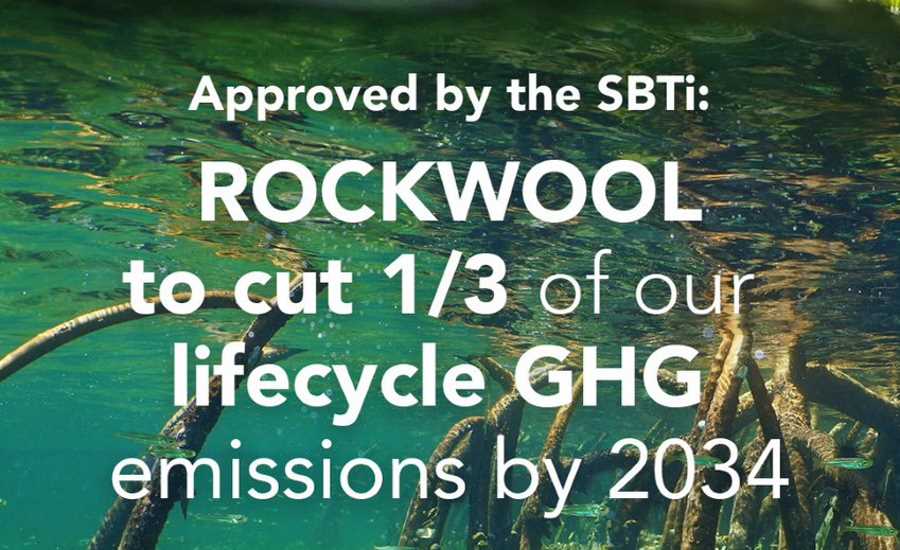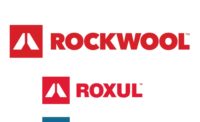ROCKWOOL, the world’s leading manufacturer of stone wool products, announces ambitious, science-based global decarbonization targets that have been verified and approved by the Science Based Targets initiative (SBTi).
Key elements of ROCKWOOL’s decarbonization plans include:
- Cutting factory absolute greenhouse gas emissions by 38 percent by 2034 (relative to baseline year 2019) [1]
- Reducing non-factory, absolute lifecycle greenhouse gas emissions by 20 percent by 2034 (relative to baseline year 2019)[2]
These absolute emission reduction targets, which supplement our existing sustainability goals, equate to an ambitious one-third reduction of ROCKWOOL’s lifecycle (Scope 1, 2, and 3) greenhouse gas emissions by 2034, while at the same time ensuring continued reduction in the carbon intensity (carbon emitted per ton produced) of our production.
ROCKWOOL Group CEO Jens Birgersson says, “We’re proud to be among the few energy-intensive manufacturing companies whose science-based emission reduction targets SBTi has verified and approved. These new targets build on the strong foundation that we are already a net carbon negative company. Though not many companies can make that claim, we also know it’s not enough, which is why we have committed to this ambitious decarbonization pathway”.
Further elaborating on ROCKWOOL’s decarbonization commitment, Jens Birgersson continues, “Achieving these emission reduction targets will be an important step in realizing the global ambition to reduce society’s greenhouse gas emissions to net zero by 2050. By demonstrating that an energy-intensive manufacturing company can achieve these targets, we hope to inspire others to take actions to help create a greener, more sustainable future”.
Alberto Carrillo Pineda, Director, Science Based Targets at CDP, one of the Science Based Targets initiative partners, comments, "We congratulate ROCKWOOL Group for being leaders in their sector by having the Science Based Targets initiative approve their emissions reduction targets, By setting targets that are grounded in climate science, ROCKWOOL Group is setting themselves up for success in the transition to a net-zero economy”.
The new decarbonization commitments build on ROCKWOOL’s existing status as a net carbon (CO2e) negative company, in that over the lifetime of its use, the building insulation ROCKWOOL sold in 2019 will save 100 times the carbon emitted in its production[3]. The ability to infinitely recycle stone wool without any loss of performance also sets it apart from non-recyclable construction materials that might otherwise be incinerated, resulting in end-of-life emissions. Recycling stone wool at our factories contributes to reducing production-related carbon emissions.
Building on our decades-long efforts to improve the energy efficiency of our own operations, reducing the direct emissions from our production is a key focus of our technology innovation. For example, we are developing large-scale electric melting technology, which is environmentally well-suited in countries where the electricity grid is already low carbon. That’s why we chose our factory in Moss, Norway to pilot what will become the industry’s largest electric melter. With the new melter’s start-up, the Moss factory’s carbon emissions will fall by approximately 80 percent.
As we continue decarbonizing, we are already reaping the benefits of substantial investments in industry-leading fuel-flexible melting technology that allows us to shift from coal to less carbon-intensive fuels such as natural gas or biogas in the facilities where this technology is being used. In addition to converting our two Danish factories to natural gas in 2020 and certified climate-neutral biogas in 2021, we will also in 2021 convert one of our factories in Poland to natural gas and start-up operations at our newest facility under construction in the United States with natural gas rather than coal. We plan to convert other factories using this fuel-flexible melting technology from coal to gas over the next few years.
Going forward, the learnings we gain from these multiple innovations and our ongoing energy efficiency efforts will be applied elsewhere in ROCKWOOL’s global operations.



